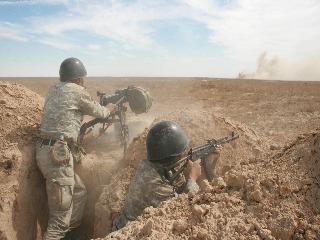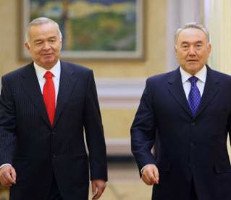Kazakhstan's Counter-Terrorism Strategies for The Post-2013 Security Environment
By Jacob Zenn (the 04/09/2013 issue of the CACI Analyst)
Since the first terrorist attacks struck Kazakhstan in 2011, the country has reformed its counter-terrorism strategy to confront emerging threats. Kazakhstan learned that more intelligence and understanding of extremists could have prevented the attacks. The country also saw that counter-radicalization programs are necessary to counter Salafism, which is anathema to the country’s religious traditions and can serve as a gateway to jihadism. In the near future, Kazakhstan will also focus on regional counter-terrorism cooperation to limit the fallout of wars abroad on the home front.

President Nazarbayev Sets New Goals Before Parliament
By Georgiy Voloshin (the 04/09/2013 issue of the CACI Analyst)
On September 2, Kazakhstan's President Nursultan Nazarbayev officially opened the new session of the country’s Parliament after a traditional summer recess. At the beginning of his address, the head of state commended the work of the current legislature formed as a result of early parliamentary elections in January 2012. Apart from the ruling Nur Otan party, which dominated the lower chamber of Parliament for the five preceding years, two other political parties are since represented there, even if their relative weight remains insignificant. Nazarbayev’s praise also comes as a confirmation of his lasting trust in the deputies, whereas a number of experts previously predicted new snap after the controversy caused by the pension reform law.
Kazakhstan Boosts Antiterrorist Policies in Response to Growing Threats
by Georgiy Voloshin (the 08/21/13 issue of the CACI Analyst)
On August 14, President Nazarbayev adopted new procedures regarding the notification of terrorist threats and the coordination of antiterrorist activities by competent state bodies. According to these rules, threats are now divided into three distinct categories each having its own color: yellow for potential security risks identified by law enforcement authorities, orange for confirmed risks and red for perpetrated terrorist attacks or the possibility of repeated attacks. In an interview to local media, the secretary of the ruling party NurOtan, Erlan Karin, said that Kazakhstan’s leadership had previously acknowledged serious gaps in the management of security risks, including terrorist and extremist activities.
Uzbekistan and Kazakhstan: Competitors, Strategic Partners or Eternal Friends?
by Farkhod Tolipov (the 08/07/2013 issue of the CACI Analyst)
Kazakhstan’s president Nursultan Nazarbayev made an official visit to Tashkent on June 13, 2013, which was expected to be a breakthrough in Uzbekistan-Kazakhstan relations. During the visit, the two states signed a Treaty on Strategic Partnership. This event can indeed be considered a breakthrough in bilateral relations between the two states, which have until recently been perceived as competitors for regional leadership in Central Asia. While Kazakhstan, Kyrgyzstan and Uzbekistan signed an unprecedented Treaty “On Eternal Friendship” in the late 1990s, the Uzbek-Kazakh friendship has always been fragile and hardly eternal. Will the new Treaty change the status-quo in Central Asia?

Kazakhstan and the UK Launch Strategic Partnership
by Georgiy Voloshin (07/10/2013 issue of the CACI Analyst)
On June 30 and July 1, British Prime Minister David Cameron paid his first official visit to Kazakhstan. This was also the first ever visit of a head of the British government to this Central Asian country. Accompanied by Kazakhstan’s President Nursultan Nazarbayev, Cameron took part in the inauguration of an oil-processing plant off the Caspian coast in the Atyrau region. The launch of this industrial facility whose construction had lasted for more than eight years coincides with the resolution of a months-long conundrum surrounding the Kashagan oilfield, one of the largest oil deposits in the world discovered during the last 40 years.



